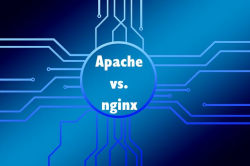Nginx vs. Apache - What are the differences?
 To deliver websites on the internet, a web server is required. This often involves using one of the two open-source solutions, Nginx or Apache. But what are the differences between the two options, and which web server is best suited for your own online project?
To deliver websites on the internet, a web server is required. This often involves using one of the two open-source solutions, Nginx or Apache. But what are the differences between the two options, and which web server is best suited for your own online project?
The role of the web server is to deliver documents from a server to clients, such as the web page visitor's browser. This process is essential for web pages to be accessed from any device worldwide. For smooth data transfer, a properly configured web server is necessary. While there are various software solutions available, the market is mainly dominated by three web servers. On one side is Microsoft's Internet Information Services (IIS), and on the other side are the two open-source solutions, Nginx and Apache. While Microsoft's solution is proprietary software, Nginx and Apache, like LiteSpeed, are free software. To understand the differences between the two software solutions, it is important to first examine each individually in the context of Nginx vs. Apache.
Apache Web Server
The Apache HTTP Web Server is almost as old as the internet itself. Its development began in 1994 when the then-standard web server, NCSA HTTPd, was expanded. The first version of the software was released by the Apache Software Foundation in 1995. The Apache Web Server quickly gained popularity and became the most widely used web server on the internet in a very short time. Even today, Apache remains the most widely used web server.
The Apache HTTP Server is popular for its long history of development, extensive documentation, open-source community, and flexible deployment options. It can be used on almost all operating systems, from Unix and Linux to Windows and Netware. Due to its modular structure, Apache can be extended as needed for different use cases. For example, communication between the server and client can be encrypted using the mod_ssl module, or complex changes to URLs can be made using the mod_rewrite module.
Secure web hosting with Apache web server now
Go to Apache Web Hosting Comparison
Nginx Web Server
The Nginx web server is a relatively new software compared to Apache. The web server was developed by Russian software developer Igor Sysoev. The first version of the Nginx web server was released in 2004. In 2011, the company Nginx, Inc. was founded, which distributes a paid version of the web server with support and additional features. Since its release, the Nginx web server has become a popular alternative to Apache, steadily gaining market share.
The Nginx web server is particularly popular among technically savvy users. The software was developed with a strong focus on performance and server speed. The internal system structure of Nginx is more compact, ensuring consistent resource usage especially with a high number of connections and processes. Nginx runs on most operating systems such as FreeBSD, Linux, or Windows. Additionally, the functionality of the software can be individually expanded with additional modules like load balancing or reverse proxying.
Secure web hosting with Nginx web server now
Go to Nginx Web Hosting Comparison
Nginx vs. Apache - The Differences
The main difference between Nginx vs. Apache lies in the delivery of static content. The Nginx web server can serve static files such as images or scripts faster and more efficiently, as it can handle requests in parallel. When it comes to delivering dynamic content generated, for example, through PHP, the performance of both systems is nearly equal. However, the Apache web server offers the advantage of being able to make individual configurations at the folder level through the .htaccess system. Utilising .htaccess with Nginx is not as straightforward. This feature is lacking in Nginx, which is why it is less commonly used in shared web hosting environments and is more commonly used on dedicated servers.
Nginx vs. Apache - Conclusion
Both web server variants, Nginx and Apache, have their individual advantages and disadvantages. Therefore, a clear winner cannot be determined. It depends more on the specific requirements of your own web project. Additionally, there are numerous providers in the market offering both Apache web hosting and Nginx web hosting.
For a comprehensive comparison of the advantages and disadvantages of other web server variants, check out:
Apache vs. LiteSpeed
Apache vs. IIS
Nginx vs. LiteSpeed
Our article is based on our own experiences, research, and information from external sources.
Sources & further links on the topic:
https://httpd.apache.org/ (official website of the Apache web server)
https://www.nginx.com/ (official website of the Nginx web server)
Image credit:
Gerd Altmann on Pixabay
Write a comment
- Webserver
Tags for this article
More web hosts
More interesting articles
What does CGI-bin mean & what do I need it for
We'll show you what CGI-bin means and what you need it for on your website.




